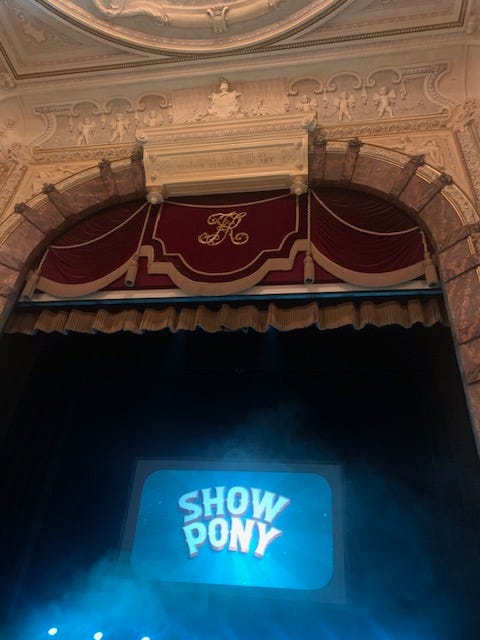I went to see Nick Mohammed in Richmond last Friday for the press night of his latest tour, Show Pony. It was a great show and you can read my review here. One thing I didn't mention in the review, however, was that the structure was slightly unusual.
At the scheduled start time Mohammed came on as his alter ego, Mr Swallow, but after a tantalising 15 minutes of Rubik’s Cube magic tricks and jokes about the age restrictions on Lego toys he introduced his support act Rose Johnson and disappeared into the wings to prepare and put his sparkly jacket on.
Johnson was a perfectly good support act. She has even appeared in the Nick Mohammed-adjacent comedy Ted Lasso so there was a connection there. But has anyone ever anywhere said at the start of a comedy show, "Ooh fantastic, a support act I've never heard of."? I imagine that as soon as Mohammed had come on the audience collectively settled in for a full night of Mr Swallow.
In a way this break with tradition was even worse than the normal support protocol where the very first act onstage is the warm-up. I have to be honest, I've been to lots of gigs in the past when the audience has eagerly anticipated the act they've come to see at 7.30pm only to be greeted by a complete unknown. You can almost feel the room deflate when it happens.
A good support act can win crowds round of course and I've seen some peaches in my time and discovered new talent this way over the years. Josh Widdicombe supporting Stephen Merchant for example. Or Suzi Ruffell supporting Josh Widdicombe. A long long time ago Lee Evans did his classic Bohemian Rhapsody routine when he was on tour with Mark Thomas. Now that was a tough act to follow.
There are a number of reasons to have a support act. Some performers don't like touring on their own so it's a way of having company on the road. Other acts may not have enough material to fill two 45 minutes halves. They may be touring with a show that premiered at the Edinburgh Fringe, where the format is one hour straight through so it is better just to do it in the second half.
Some comics extend their hour on tour where it finally has room to breathe and spread it over two halves. Others kick off with more of a club set in the first half and save the 'proper' set for the second half. Maisie Adam, another favourite of mine, did some brilliant spontaneous crowd work in the first half of her latest tour Appraisal.
So there are all sorts of ways an act can keep the evening to themselves. The main thing though for UK touring acts is that there has to be an interval to keep the venue - or whoever gets the bar profits – happy. Let's not beat around the bush, British audiences love to drink. Sometimes I've been to gigs where the performance has almost felt like an inconvenience for lads out on the lash.
It's very different in America of course where drinking culture is different. Lucy Porter used to tell a joke about how in America they say going for drinks after work and they mean one drink. In England we say going for a drink and you wake up the next morning in a skip.
In America the ticket for a club gig might include the cost of a drink - a "one drink minimum" - but it's often more like a one drink maximum. In America gigs often aren't geared towards an interval. You might still have a support act but they are more like hypemen who will introduce the main attraction without giving anyone a chance to hurtle to the bar.
The American way always makes more sense to me. Why work the crowd into a lather of anticipation and then have a twenty minute break where all that anticipation can dissipate? You don’t have a warm-up act when you go to see Ibsen or Chekhov.
As I said, Nick Mohammed's show was great. But I can't be the only person who thinks it could have been even greater if it had been Nick Mohammed from soup to nuts.
Nick Mohammed is currently on tour. Dates here.
Picture of Nick Mohammed by Paul Gilbey






Interesting take. I think that for the sake of the comedy eco system, it's worth having a support act. Done well, it's a bit like the trailers in the cinema. "If you like me, you'll love..." means that audiences have an idea who they might like to go out and see next time they go.
I’ve supported Tim Vine for over 20 years (mainly coz it’s fun) I think it took about 5 years before the audience finally resigned themselves to the fact that they were stuck with me!